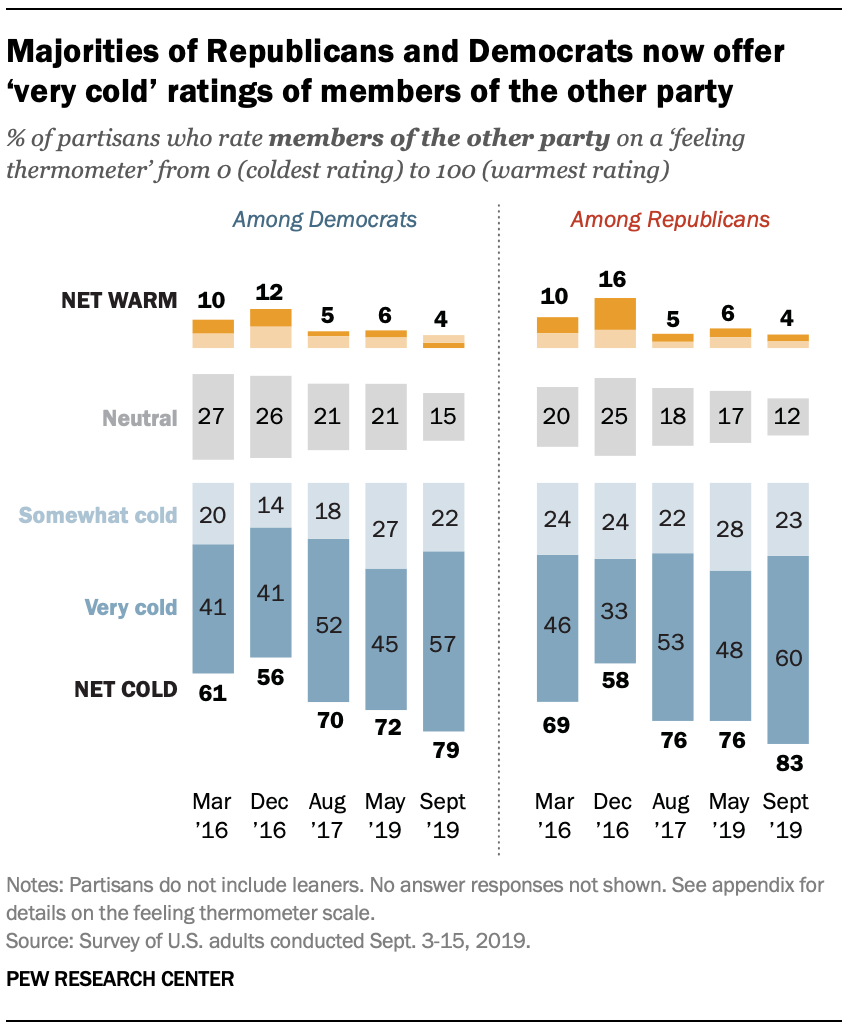Large shares of Republicans and Democrats associate several negative traits with members of the other party. Wide majorities in both parties – three-quarters of Democrats (75%) and 64% of Republicans – say those in the other party are more closed-minded than other Americans. And 55% of Republicans and 47% of Democrats view members of the other party as more immoral than other Americans. In both parties, the share saying those in the other political camp are closed-minded or immoral has increased since these questions were last asked in 2016.
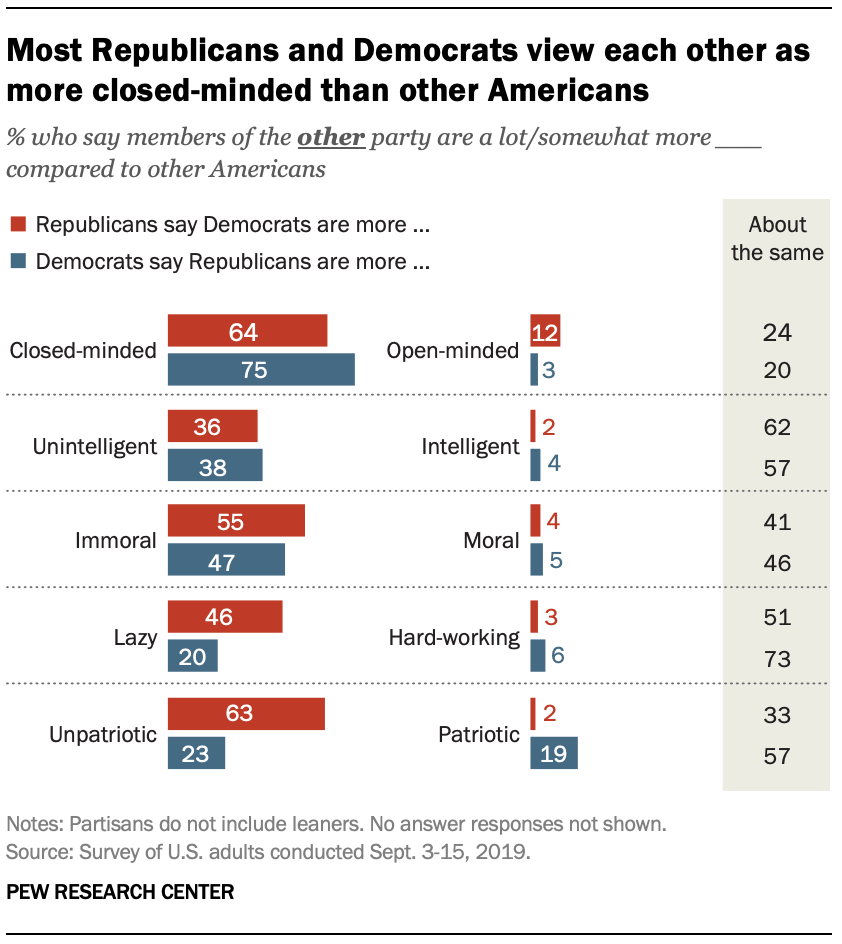
Republicans are substantially more likely to characterize Democrats as more unpatriotic than other Americans than Democrats are to say this of Republicans: 63% of Republicans view Democrats as more unpatriotic. By comparison, just 23% of Democrats say this about Republicans, while a majority (57%) say Republicans are about as patriotic as other Americans. In fact, Democrats are roughly as likely to say Republicans are more patriotic than other Americans as they are to say they are less patriotic (19% vs. 23%).
Republicans also are more likely to describe Democrats as lazy than Democrats are to characterize Republicans in this way. Still, this is a minority opinion in both parties (46% of Republicans and 20% of Democrats view those in the other party as more lazy than other Americans).
Most Democrats and Republicans do not think of those in the other party as different from their fellow Americans when it comes to intelligence (roughly six-in-ten say they are about the same as other Americans). However, 36% of Republicans and a similar share of Democrats (38%) do say those in the other party are more unintelligent than other Americans.
Overall, roughly eight-in-ten Republicans (82%) and Democrats (78%) say at least one of these negative descriptors applies to those in the other party. But Republicans are substantially more likely than Democrats to ascribe multiple negative characteristics to Democrats. Seven-in-ten Republicans ascribe two or more of the five negative characteristics to Democrats, while 58% of Democrats associate two or more of these characteristics with Republicans. And 20% of Republicans associate all five negative characteristics with Democrats, while 8% of Democrats say all five negative descriptors apply to Republicans.
More now associate some negative traits with the ‘other side’ than in 2016
The shares of both Republicans and Democrats ascribing several of these negative traits to members of the other party have increased significantly since the spring of 2016.
The share of Republicans who say Democrats are more closed-minded has increased substantially over this time period. In 2016, about half of Republicans (52%) said Democrats were more closed-minded than other Americans. Now, a clear majority (64% of Republicans) say this – an increase of 12 percentage points. While the shift is more modest among Democrats, it is in the same direction (from 70% to 75% saying Republicans are more closed-minded than other Americans).
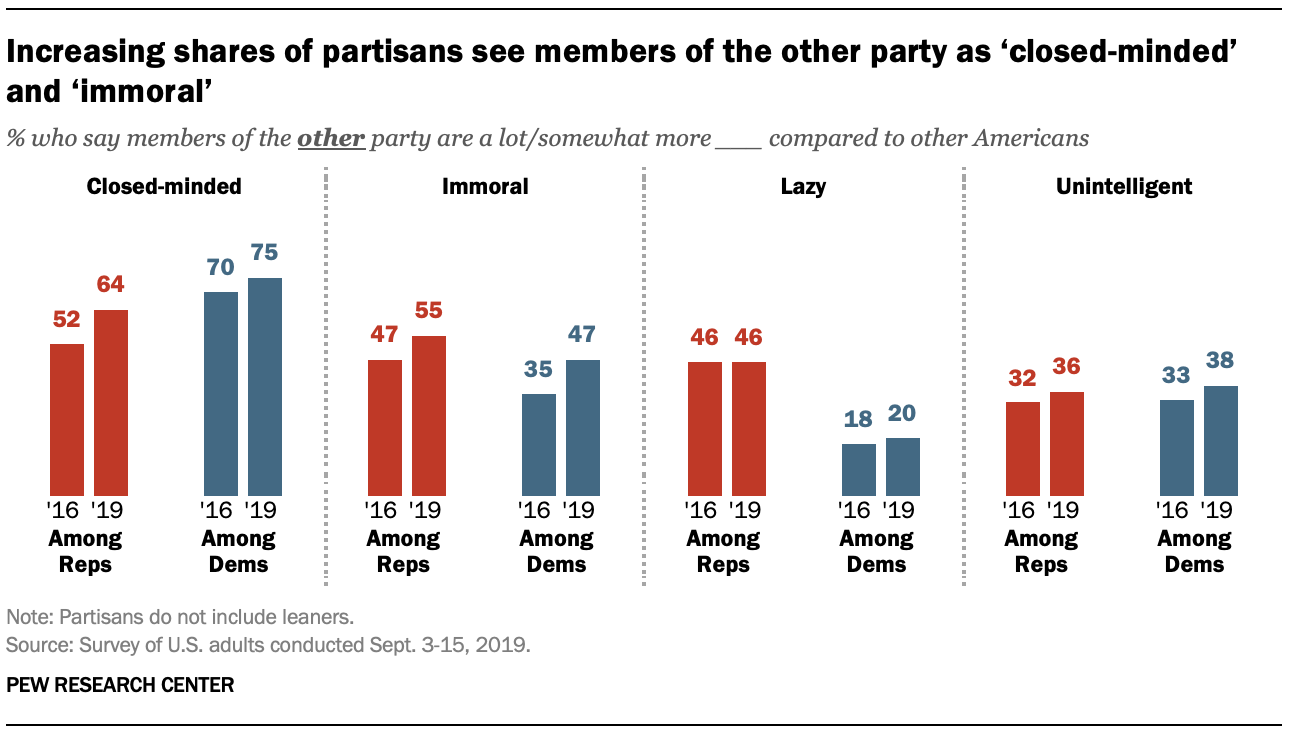
Members of both parties are now substantially more likely to say those in the other party are more immoral than other Americans than they were three years ago. Today, 47% of Democrats say this of Republicans, up from 35% in 2016. The share of Republicans who say Democrats are more immoral than other Americans is 8 percentage points higher (47% then, 55% today).
There has been little or no change in the shares of Republicans and Democrats saying that members of their opposing parties are lazier or more unintelligent than other Americans.
How partisans see themselves: Republicans say they are more patriotic than others, Democrats say they are more open-minded
Many Republicans and Democrats also associate their fellow partisans with positive traits. And with some exceptions, these are broadly the inverse of how they see the other party’s members.
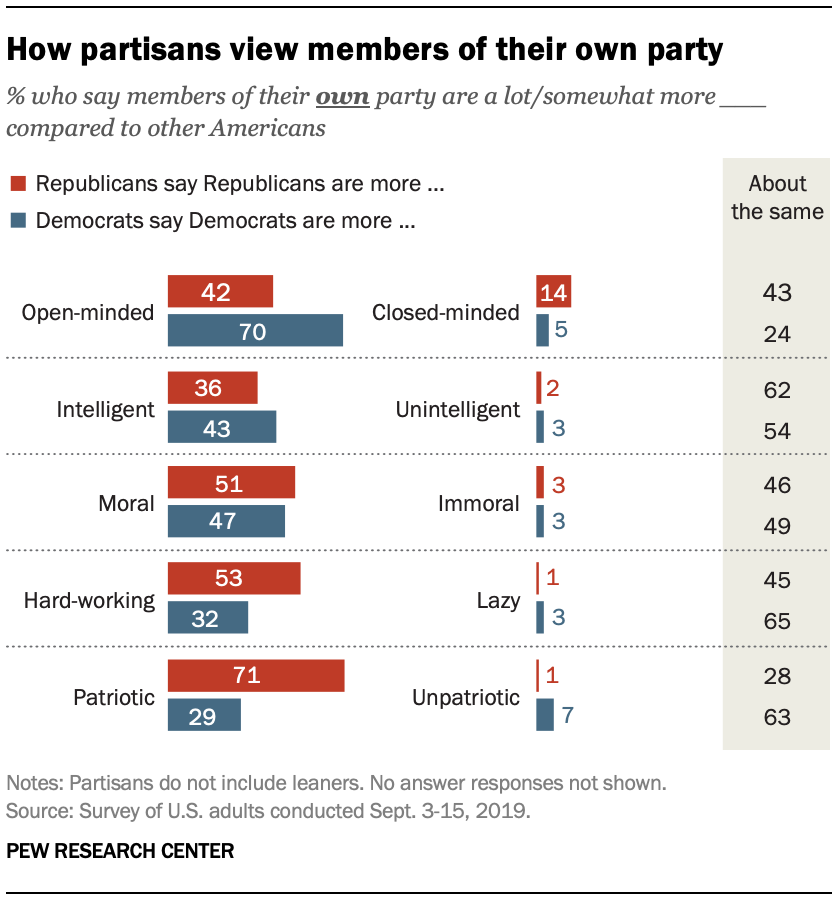
A clear majority (70%) of Democrats say that Democrats are more open-minded compared with other Americans. Republicans are considerably less likely to ascribe this trait to members of their party: 42% say members of the GOP are more open-minded than other Americans, while about as many (43%) say they are on par with other Americans (14% say they are more closed-minded).
However, Republicans are much more likely than Democrats to describe members of their own party as more patriotic (71% say this). By comparison, just 29% of Democrats say Democrats are more patriotic than other Americans (the majority – 63% – say they are about the same as other Americans).
While majorities of those in both parties say their co-partisans are about as intelligent as other Americans, Democrats are slightly more likely to view members of their party as more intelligent (43%) than Republicans are (36%).
Partisans say their differences with other party extend beyond politics
Majorities in both parties say that, aside from political differences, people in the other party do not share many of their other values and goals. About six-in-ten Republicans (61%) say, thinking about more than just politics, Democrats do not share many of their other values and goals; 54% of Democrats say the same about Republicans.
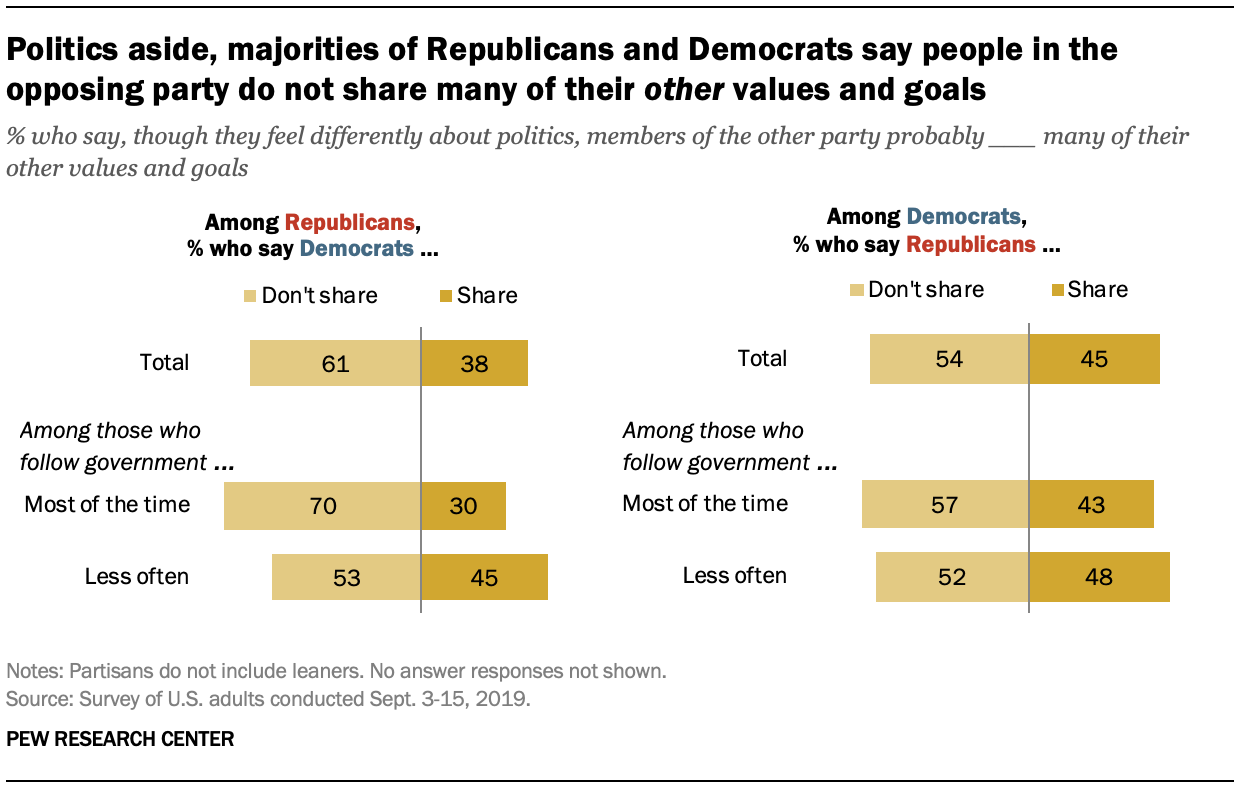
In the current survey, politically attentive Republicans are especially likely to say Democrats do not share their nonpolitical values and goals. Among Republicans who follow government and public affairs most of the time, 70% say that, setting political differences aside, Democrats do not share many of their other values and goals. That compares with 53% of Republicans who follow government less often.
Among Democrats, the differences based on attentiveness to government and politics are more modest: 57% of highly attentive Democrats say Republicans do not share many of their other values and goals, compared with 52% of less politically attentive Democrats.
Republicans, Democrats are increasingly positive about members of their own parties
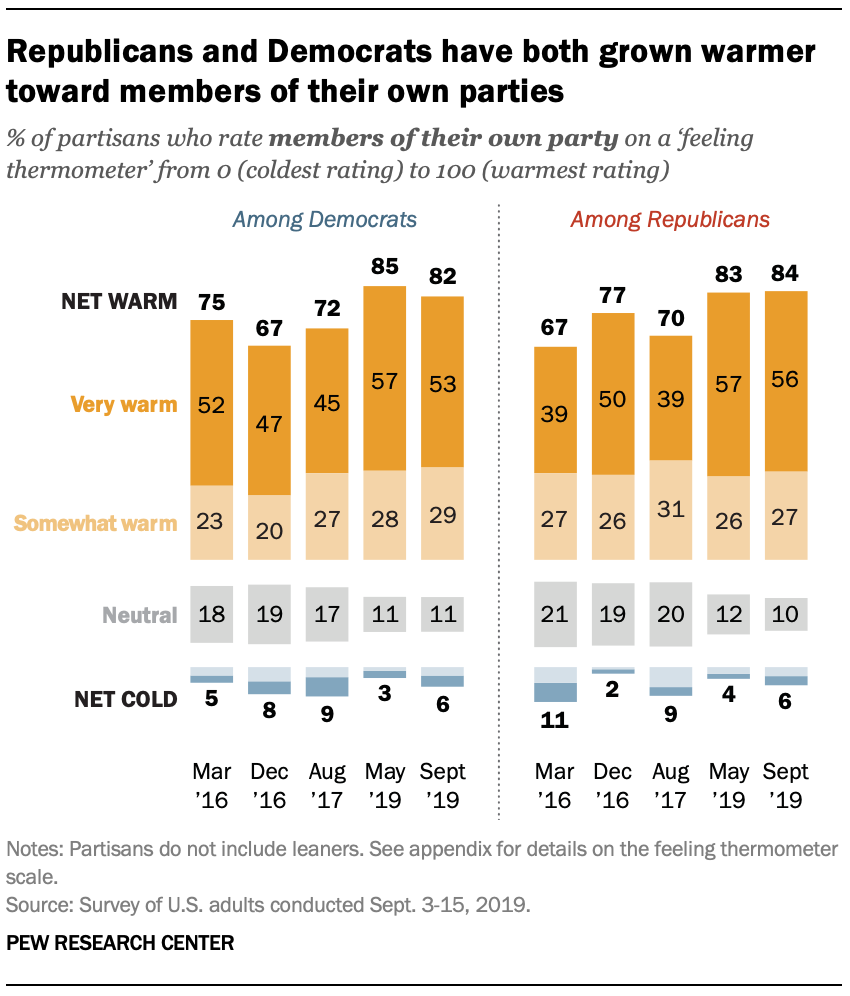
When asked to rate Republicans and Democrats on a “feeling thermometer” between 0 and 100 – where 0 is the most negative rating and 100 is the most positive rating – large majorities of partisans rate the members of their own party warmly. In both parties, the shares giving warm ratings (a rating of 51-100) have increased since March 2016.
About eight-in-ten Democrats (82%) and Republicans (84%) feel warmly toward their own party. In March 2016 – prior to the conclusion of the presidential primaries – 75% of Democrats and 67% of Republicans said that they had a warm view of their fellow partisans.
Since 2016, the shares of partisans with neutral feelings (a rating of 50 on the 0-100 thermometer) toward members of their own party have dropped from about one-in-five (19% of Democrats and 22% of Republicans) to about one-in-ten (11% of Democrats and 10% of Republicans).
As Republicans and Democrats take an increasingly positive view of members of their own parties, they have become more negative toward members of the opposing party.
Today, 79% of Democrats and 83% of Republicans rate the other party coldly (a thermometer rating of 0-49).
Three years ago, narrower majorities in both parties gave the other party a cold rating. In March 2016, 61% of Democrats gave Republicans a cold rating and 69% of Republicans gave Democrats a cold rating.
Since 2016, there has been an especially sharp rise in “very cold” feelings toward the opposing party. In March 2016, 41% of Democrats and 46% of Republicans gave the other party a very cold rating (less than 25 on the 0-100 scale). Today, 57% of Democrats and 60% of Republicans give the other party a very cold rating. And about three-in-ten Democrats (30%) and Republicans (32%) give members of the opposing party a rating of zero – the lowest on the scale.
‘Leaners’ are much less warm to their own party than are partisans
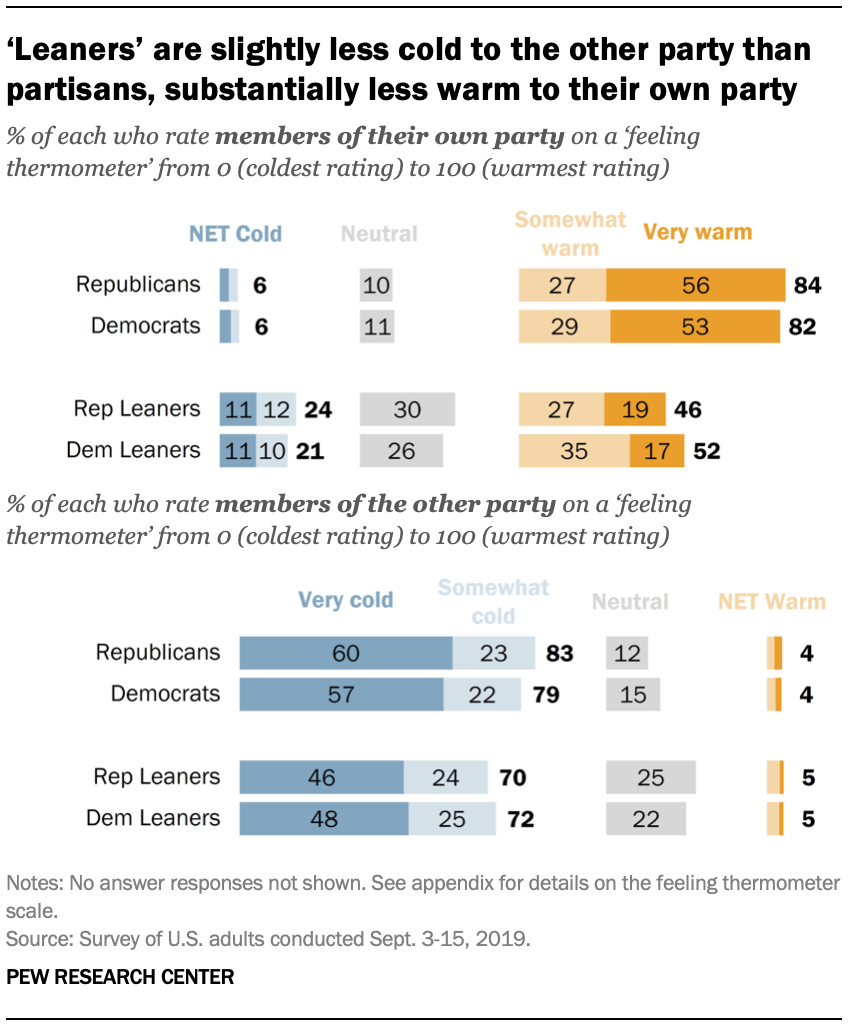
Compared with those who identify with one of the political parties, those who “lean” toward a party are considerably less likely to view members of their own party warmly. However, they are only modestly less likely to give a cold rating to the opposing party.
While about eight-in-ten of those who identify with a party (84% of Republicans and 82% of Democrats) say they have warm feelings toward the members of their own party, only about half of partisan leaners say the same.
Among Republicans leaners, 46% rate Republicans warmly, while about as many Democratic leaners (52%) rate Democrats warmly.
However, majorities of partisan leaners – and those who identify with a party – have negative opinions of members of the opposing party. About eight-in-ten partisan identifiers (83% of Republicans and 79% of Democrats) have a cold view of the other party compared with about seven-in-ten leaners (70% of Republican leaners and 72% of Democratic leaners).
Growing shares of partisans give opposing ratings to the two parties
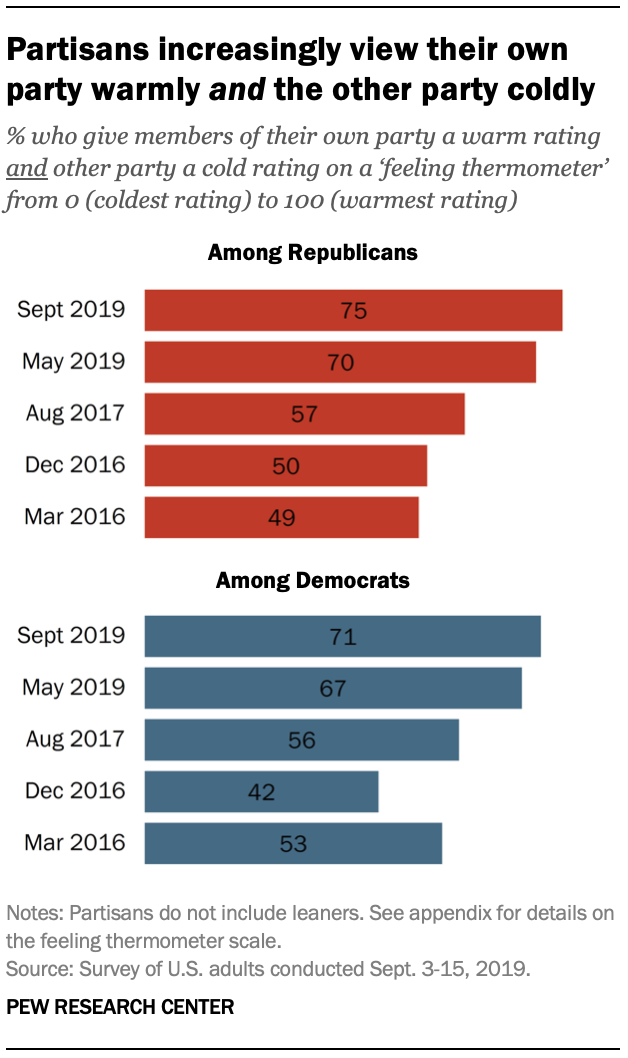
Three-quarters of Republicans (75%) and 71% of Democrats now rate the members of their own party warmly and the other party coldly. In both parties, the shares holding this combination of views have steadily increased over the past three years.
The share of Republicans with this combination of views is 26 percentage points higher than it was just three years ago (75% now, 49% then). Among Democrats, there has been a similar increase in the share with a warm view of Democrats and a cold view of Republicans over this period (71% now, 53% then).
Men, older partisans most likely to view the other party ‘very coldly’
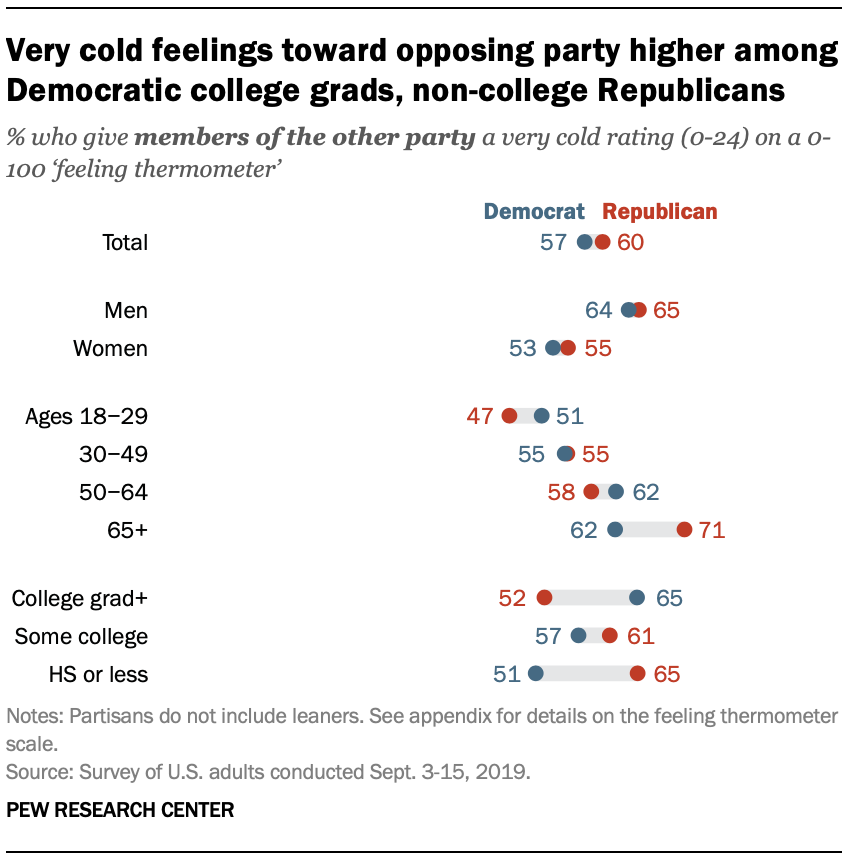
In both parties, there are gender, age and educational differences in “very cold” (0-24) ratings of members of the opposing party.
Men in both parties are more likely than women to give colder ratings to the members of the other party. About two-thirds of Republican (65%) and Democratic (64%) men give the other party a very cold rating.
By comparison, 55% of Republican women and 53% of Democratic women offer a very cold rating to the members of the other party.
Similarly, in both parties, younger adults are less likely than older people to give highly negative ratings to the members of the opposing party.
Yet the education differences in these attitudes differ among Republicans and Democrats. Nearly two-thirds of Democrats with at least a four-year college degree (65%) give Republicans a very cold rating. That compares with 51% of Democrats who have not attended college. The pattern is reversed among Republicans: 52% of Republicans with a college degree give Democrats a very cold rating, compared with 65% of those with no college experience.
Politically attentive have stronger feelings toward both parties
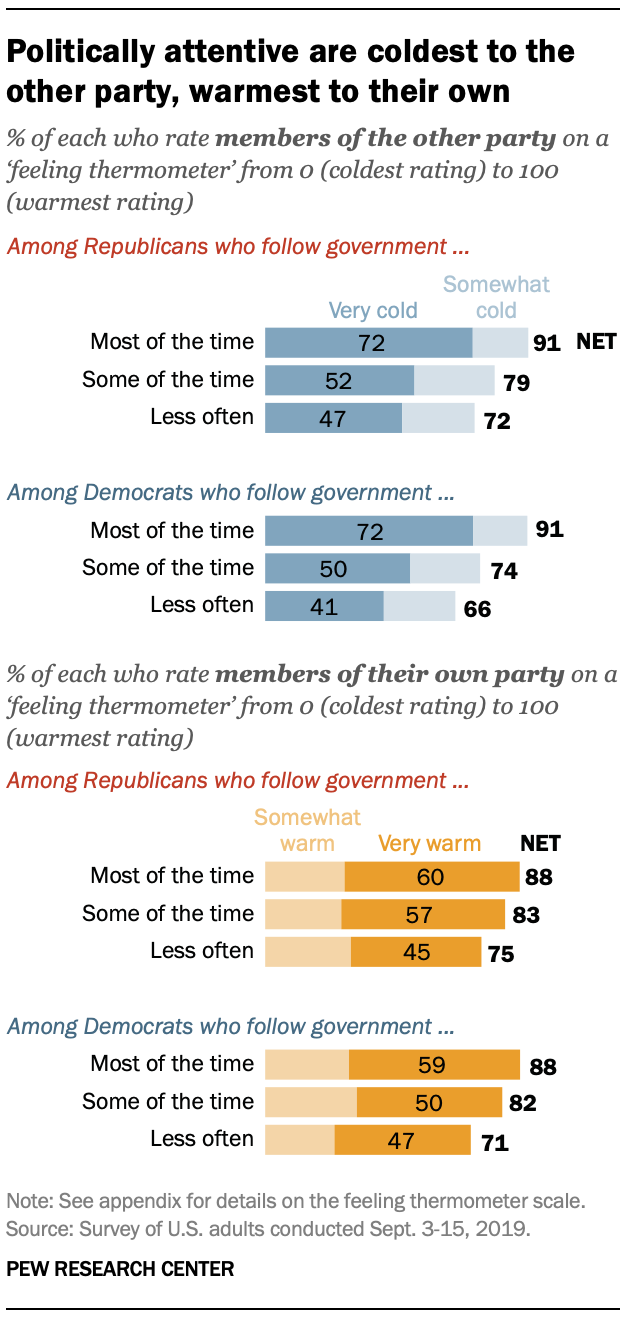
Partisans who follow government and politics most closely are more likely than less attentive partisans to give a cold rating to the other party – and a warm rating to their own.
About nine-in-ten (91% of both Republicans and Democrats) who say they follow government and public affairs most of the time give members of the other party a cold rating. By comparison, smaller majorities of those who follow government some of the time or less often give the opposing partisans cold ratings
The most politically attentive are also most likely to have warm views of their own party. Overwhelming majorities of partisans who say they follow government most of the time give members of their own party a warm rating (88% of both Republicans and Democrats). Narrower majorities of those who are less attentive to politics say the same.
